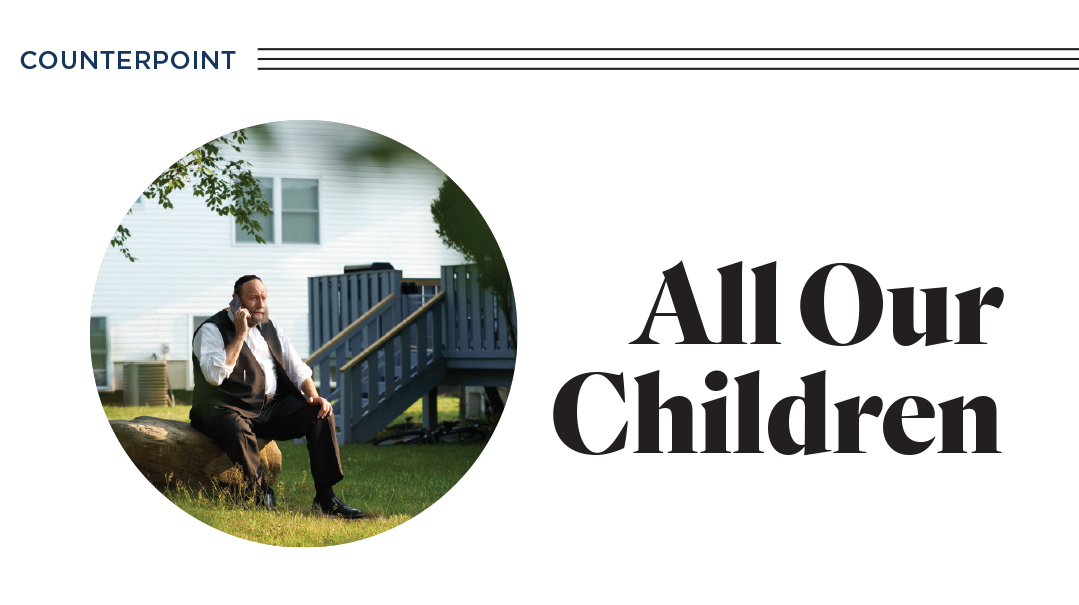Lonely at the Top: The conversation continues, part 2

"Does chinuch add up to support a frum lifestyle? No. Is it a crime? Yes"
THE WAY IT’S BEEN DONE › Concerned for my community

I want to thank the magazine and Rabbi Besser for publishing the piece “Scared to Shine.” As a younger, energetic, and involved balabos in an older, out-of-town community, it spoke to me. A lot.
Breaking down the “this is how we’ve always done it” complex is so challenging, yet no one thinks about why they do it. The funny part is, many of the people involved in the community are businessmen and they would never operate their businesses with that attitude. Yet they’ll let a mosad operate inefficiently, because the older operating model is what’s been done.
I hope the many energized askanim in Klal Yisrael don’t give up and remember the words we say every Shabbos morning about Hashem repaying those who faithfully serve their communities.
ALREADY ACHIEVING THE GOALS › Dr. Shmuel Zentman, chairman of the board, Torah Umesorah
I noted with interest Rabbi Avrohom Neuberger’s recent article, “A Crisis or a Challenge,” which laments a number of issues that the world of chinuch faces today. Indeed, the situation is fraught with complexities.
The writer is quite right in suggesting that it is Torah Umesorah that ought to be taking the lead in initiatives to develop future leaders. However, what is omitted is actual information regarding the growing number of initiatives and programs that have been in fact implemented — some for many years — and are indeed illuminating the chinuch paths for Torah educators across the continent and beyond.
As a member of the organization’s executive board, and as an individual who has been closely involved with Torah Umesorah for decades, I can only express pride stemming from the many accomplishments made by our organization.
Some of our most significant leadership initiatives over the past decade alone include the following:
The Principals Fellowship Program for men and women, which has graduated 200 principals over the course of eight years (the training period for each cohort is two years); annual leadership summits for menahalim and menahalos, that is, three annual conferences, national pre-convention programs and midwinter conferences, exclusively for principals; summer seminars for principals (150 principals are currently taking part in this summer’s program); “Leadership Coaching” — an initiative that provides tens of hours of mentoring to principals by our executive consultants, with the aim of assisting them in leadership roles, providing them with our broad vista of resources, and coaching them to navigate through problems in actual practice; and networking sessions — not only at every conference but, more formally, through virtual platforms eight times a year. (These networking sessions for principals are held both regionally and nationally.)
Additionally, we offer instructional coaching collaboratives for master teachers, our future leaders. Torah Umesorah also trains instructional coaches in schools as a part of the schools’ leadership teams. To date, 215 coaches have received this vital training.
Beyond all these initiatives, there is a wide array of training courses, networking programs, and teacher-training programs that have comprised one of the organization’s mainstay tracks for decades. Our trainees continue to make their mark upon the chinuch scene everywhere.
In terms of lay leadership, Torah Umesorah’s annual Presidents Conference offers unique professional learning opportunities for askanim, including guidance and skill-building for effective school governance.
As for kiruv and the development of our Jewish communities, Torah Umesorah has founded over three dozen kollelim across America, and we have placed hundreds of klei kodesh in positions of leadership across the entire terrain. These include rabbanim, roshei kollelim, menahalim, and many more.
I do commend Rabbi Neuberger for bringing critical issues to the forefront for readers. By so doing he helps to elevate the frum community’s priorities from the mundane to the critical. However, I want to share with him and with your readers the fact that for nearly 80 years, Torah Umesorah has been achieving the very goals outlined in his article… and much more.
Additional projects are constantly explored and implemented. Torah Umesorah continues to be the go-to organization dealing with issues raised by the choshuve author.
MORE STABLE THAN IT SEEMS › Hillel Adler, Consortium of Jewish Day Schools
Kudos to Mrs. Fleksher for bringing to public discussion the teacher shortage issue in Jewish day schools. Unfortunately, without enough yeshivah and Bais Yaakov graduates taking positions in day schools, we are backtracking on all the accomplishments of the day school movement of the last 75 years.
These schools are critical in smaller communities where the day school is the anchor for all meaningful Jewish life in a city. We have seen too often that when the school dies, the Jewish community dies. It is ironic that at a time with the largest-ever numbers in yeshivos and Bais Yaakov schools, we have fewer young men and women taking teaching positions than we did 50 years ago.
I agree that the first step in tackling the teacher shortage issue is to bring awareness to the public about its existence and the severity of its implications. However, to make progress, we need real solutions. Fortunately, the Consortium of Jewish Day Schools (CoJDS), in partnership with Cross River Bank, has begun an initiative called Lilmod Ul’lamed to address the issue.
In its pilot year, the program trained 12 kollel fellows looking to take careers in chinuch. The primary focus is to help day schools in “out-of-town” communities. The strategy is to first recruit from community kollelim such as Columbus, OH, and Jacksonville, FL, to help fill positions in similarly sized cities. In addition to regular online training classes, trainees receive practical classroom experience in partnership with their local day school. Mrs. Miriam Gettinger, principal of the Hasten Hebrew Academy, summarized the success of the program: “The partnership with CoJDS has been a lifeline for me professionally.”
While Mrs. Fleksher’s article made several good points about the causes of the shortage, I would like to take issue with the concept that chinuch does not earn a livable salary. The flip side of “fuzzy math” is that positions in chinuch could potentially hold more financial stability than it appears. Significant savings can add up on items such as parsonage, QTR, employee tuition discounts, and lower housing costs in smaller communities. It is quite realistic that a rebbi in a small-to-mid-size community could be more financially stable than his friend in the larger community who chose real estate or Amazon as a career earning double the salary.
The staff at CoJDS has discussed the issue at length in a search for solutions with multiple leaders in the Jewish communal scene both in Israel and the US. The Cross River Lilmod Ul’lamed project is one piece of a larger strategy. CoJDS would like to bring to the table others who offer different solutions. The klei kodesh scarcity affects every segment of Klal Yisrael and is currently on track to result in frightening outcomes.
THE PATH IS TOO VAGUE › A yungerman in the trenches
The discussion about leadership has garnered much attention in my kollel coffee room. I would like to share my analysis of the situation from the trenches.
I know many yungeleit in their late twenties to early thirties who would fit the description of “future leaders.” They are smart, charismatic, serious, and great communicators. I do not believe that the issue is that leadership is not being cultivated — for the simple reason that leadership skills are mostly inborn. Most future leaders were already forming their classes’ teams during recess in grade school. Even while in kollel, there are many opportunities to hone leadership skills by helping others and conducting some small-scale askanus.
I would posit that the true question is: Where are the leaders? Many potential leaders who I discussed this with were shocked to hear that there are so many positions currently available. The reason for this disconnect is because the greatest pool of young talent is found in Lakewood, Monsey, and Eretz Yisrael. In these places there is a reverse crisis. There is a shortage of positions for capable yungeleit.
The solution seems obvious: These talented yungeleit need to move out of the young population centers in order to fill these positions. But it’s not that simple. Firstly, many of these yungeleit do not have the proper upbringing and chinuch to be effective leaders outside of Lakewood and Monsey.
Beyond that, even among those who are passionate enough to clear those hurdles, the path to leadership is simply too vague. No yeshivah, shul, or organization would be willing to hire someone straight out of kollel with little or no experience — no matter how talented and passionate he may be. However, after learning seven-plus years in kollel, it is very difficult to move a young family out of a frum population center in order to take an entry-level position that has no guarantee of reaching the end goal. It is also not a great solution to wait it out “in town.” As time moves on, one’s passion wanes and family grows, making it even less realistic to move out.
I do not see any clear solution to this issue. Perhaps creating more internship opportunities similar to those that exist for law and medical students would help. This would allow yungeleit to gain much-needed experience and also showcase their unique talents.
PARENTS, LET THEM LEAD! › A parent and mechaneches
As a mother and teacher intimately familiar with the school system, I am watching a worrying pattern emerge. In conversations with rabbanim, principals, and menahalim, I have been hearing an outsize fear of the people they are serving. In a world that has turned upside down, with rabbanim fearing their congregants, principals afraid of the school’s parent body, and menahalim worried about enrollment numbers, it has become a game of “he who screams loudest wins.”
The existing school framework was established many years ago to accommodate the needs of the previous generations and has done so beautifully to a large extent. But the world as we know it has changed drastically, and so have the people. To quote a venerable rosh yeshivah, “Today’s teens are not better or worse [than previous generations], they are a completely new creation….” Therefore, it stands to reason, they require a completely different set of tools.
What students have received by osmosis in the past may no longer work in this society of new family dynamics, technological revolutions, and many other factors. The need to reevaluate and readjust is great. The existing school system’s inadequacy in addressing the needs of today is resulting in a fallout whose price is too large to calculate.
Many rabbanim and principals recognize the chinuch issues we are currently experiencing but feel so limited in their ability to bring about the needed changes because of a paralyzing pressure created by the “Parent Body” they are serving. New ideas may meet resistance or vocal complaints to board members, so, at the end of the day, the school is in essence being run not by mechanchim, but by the parent who screams the loudest.
To be a real leader today requires a tenacity and willpower and a level of unparalleled mesirus nefesh to do what needs to be done without fear. Parents and balabatim need to understand that to continue this status quo is the easier and simpler way. To keep things running smoothly, smiling away all problems so as not to rock the boat, may earn one credit in the PR department — but not where it really counts.
When a principal or menahel is driven out of their comfort zone because their sense of achrayus is big and they are ready to tackle problems at its root, they need you. You is every parent who has a child in the school system. A child who deserves a real Jewish education. A wholesome chinuch that leaves no gaps through which to fall.
When a principal says “hineni” — I am here to take responsibility — support him. Encourage him. Trust him. Give him that ability to do. It may take some time to see results, it may take some fine-tuning and tweaking, but only with the chizuk of those he serves can he be a real leader.
WE NEED TO MAKE MONEY › A high school teacher who knows
I am a young woman a few years out of seminary who is currently a high school mechaneches, and I must admit that when Rabbi Neuberger’s and Yisroel Besser’s assessments are applied to the world of girls, I do not find those assessments to be accurate explanations as to why there is a shortage of teachers.
After all, in contrast to the lack of summer leadership opportunities for bochurim that Rabbi Neuberger points out, there are hundreds of camp counselor/head positions filled by Bais Yaakov girls every summer. And in my experience working in four very different schools, I have never found a morah who (as Yisroel Besser describes about rebbeim) felt that she could not implement her creative and innovative ideas — just the opposite, in fact.
However, Alexandra Fleksher’s point about the dismal salaries of our teachers hit the nail on the head. Recently I was at a meeting where the menaheles was decrying the lack of applicants for teaching positions, and all I could think was, Well, we do send the girls to seminaries that portray — albeit rightly so — supporting a husband in kollel as an ultimate goal, and chinuch salaries don’t dovetail with that. A very large number of my friends and former classmates who decided not to go into chinuch did so because of purely financial considerations; one friend even told me point-blank, “I can’t go into teaching. I need to make money if I want to marry a learning boy.”
And I have heard from my out-of-town friends many times about an additional reason why out-of-town girls in particular are avoiding chinuch positions like the plague. That reason is Lakewood. A sky-high percentage of out-of-town Bais Yaakov graduates end up moving to Lakewood immediately after their chasunah, and the word on the street is that as hard as it may be for a Lakewood native to find a teaching position there, it is close to impossible for a newcomer from out of town to do the same.
So what motivation is there for a girl to become a teacher in her out-of-town community after seminary if she knows that she may very well have to find a different career as soon as there is a sheitel on her head? Common sense would dictate that she invest herself in amassing experience in a field that is always looking to hire in Lakewood (like bookkeeping or secretarial work), as having prior work experience will almost automatically translate into a higher starting salary at whatever desperate-for-workers Lakewood office she ends up joining down the line.
DIFFERENT REASONS › A former morah
I write this as one who worked in the chinuch world and left, and whose husband left, too. I want to offer our differing perspectives.
My dream was to be a teacher. I loved people, I loved to teach, and I was creative. My goal in choosing a seminary 20 years ago was to find one that offered the best teacher training possible. There was no other job I wanted.
I landed a fantastic teaching job right out of seminary and my pay was… $200 a week. I supplemented by tutoring and all was great. I got married and continued to teach. We moved to another neighborhood and I was fortunate to get a job there quickly. I got $230 a week and by year three I was writing curriculum guides for the parallel classes and was getting paid $320 a week.
We were not making ends meet (one of those rare unsupported kollel couples) and so both my husband and I began tutoring. Five years into my teaching (and now making $1,350 a month), my husband applied to and got a rebbi position. His starting salary: $3,300 a month. That was my first impetus to leave. I had five years’ experience and was making 60 percent less than my husband was being offered on a starter salary. No go.
Additionally, childcare expenses were growing — this made no financial sense. I was approached by a company that wanted someone with my background in education to assist with a new project. My new salary was only about 25 percent more, but the hours were shorter and I wouldn’t have to stay up late marking tests.
I stayed at that job for nearly a decade before pivoting an education-minded nonprofit. My current salary is about four times what my colleagues who stayed in teaching are currently getting.
My husband’s journey was different. He taught and loved his talmidim, but had a challenging time with principals who thought he should just take techniques that worked for kitah gimmel and try to apply them to eighth grade. My husband felt differently and developed new approaches. The students were growing, the parents were thrilled — but the menahel did not like the chiddushim.
My husband kept at it and tried to ignore the menahel’s criticism, but the stress ate at him slowly. A decade in, he left. He realized that he wanted to still deal with children and teens but the classroom was too confining and so he went to school, got a master’s degree in social work — and found that the clinics are full of men like him in their thirties, forties, and fifties who were rebbeim and realized if they wanted flexible hours, better pay, and the ability to still interact with children… this was the way to go.
After a recent meeting with some mental-health professionals with a background in chinuch, these men realized that they’d made their career shift due to feeling their wings were clipped, feeling they couldn’t continue a life that required six days a week in the classroom with nearly no breaks plus work at home… and a general lack of positive feedback from the hanhalah.
After my husband shared this with me, I spoke to many of my friends who, like me, have left the field. I found that we had different motivations for leaving. For us it was almost always about money, money, and money. Girls’ morahs are not just underpaid — they are underpaid even by our yeshivah standards, because schools are willing to hire young girls looking for experience at any price. As that pool narrows, my hope is that schools will show appreciation to their staff and retain them more.
A year ago I was asked to sub a high school class for six weeks. The time frame was outside of my work hours and so for the kicks of it, I did it. I absolutely loved it. Teaching has an addictive edge to it when it is your passion. But there is no way I could devote my life to teaching and still make ends meet.
REALITY CHECK › An idealistic but struggling teacher
As a teacher, I have long ago made peace with the fact that teaching doesn’t equal financial security. But the tone of Mrs. Fleksher’s article suggests that she really doesn’t realize how little teachers make.
“But if someone did the math and realized a career in chinuch didn’t add up to support a frum lifestyle, that would be a crime…And if the bottom line is what’s keeping our best and our brightest away from klei kodesh…” If someone did the math? Maybe it’s just that the best and brightest of Klal Yisrael are smart enough to realize that a full-time teaching job from 8:30 to 4:00 (with after-hours grading, lesson planning, student meetings, parent meetings, teacher meetings, PTA, and report cards) and a $40K pre-taxes salary cannot support a family of any size. Realistically, most morahs and teachers work half a day, so that’s a nice gross $20K to support the family. And if you’re single, in some places you can expect a whopping $12K — for the entire year. I know, because I made that much for several years as a single teacher.
And as a married educator (Young! Energetic! Idealistic!) with a master’s degree in education and with over ten years of experience, I currently make a measly $21K. I supplement that income with tutoring, running camps, working on Sundays, and, no, my husband can’t stay in kollel. He works full-time, too.
Does chinuch add up to support a frum lifestyle? No. Is it a crime? Yes.
So where have all the good teachers gone? Anywhere else, Mrs. Fleksher. Anywhere else.
(Originally featured in Mishpacha, Issue 870)
Oops! We could not locate your form.











